What is MBA (Master Of Business Administration) course?

Image-1 Inside View of the Management Block
The Master of Business Administration (MBA) in India is a prestigious postgraduate program offering comprehensive education in management and business principles. It typically covers areas such as finance, marketing, operations, human resources, and strategy.
MBA courses in India often focus on practical application, case studies, internships, and industry exposure to prepare students for leadership roles in various sectors.
Graduates of MBA degree programs in India are sought after by employers for their advanced skills and knowledge, skills, and strategic thinking abilities, making it a valuable credential for career advancement and success.
MBA degrees often include a mix of coursework, case studies, projects, internships, and practical experiences to prepare MBA students for leadership roles in the business world. They aim to develop critical thinking, decision-making, communication, and leadership skills necessary for success in today’s dynamic and competitive business environment.
Specializations within MBA courses allow students to focus on specific areas of interest such as finance, marketing, healthcare management, technology management, or global business, among others.
Some of the most opted courses in India and St. Andrews college or different Engineering college or Management colleges are as follows:-
- Btech
- Btech CSE
- Btech ETCE
- MTech
- BCA
- BBA
- MBA
- MCA
- DPharma – St. Andrews College of Pharmacy
- BPharma – St. Andrews College of Pharmacy
- BArch – St. Andrews College of Architecture
Types Of MBA Programs
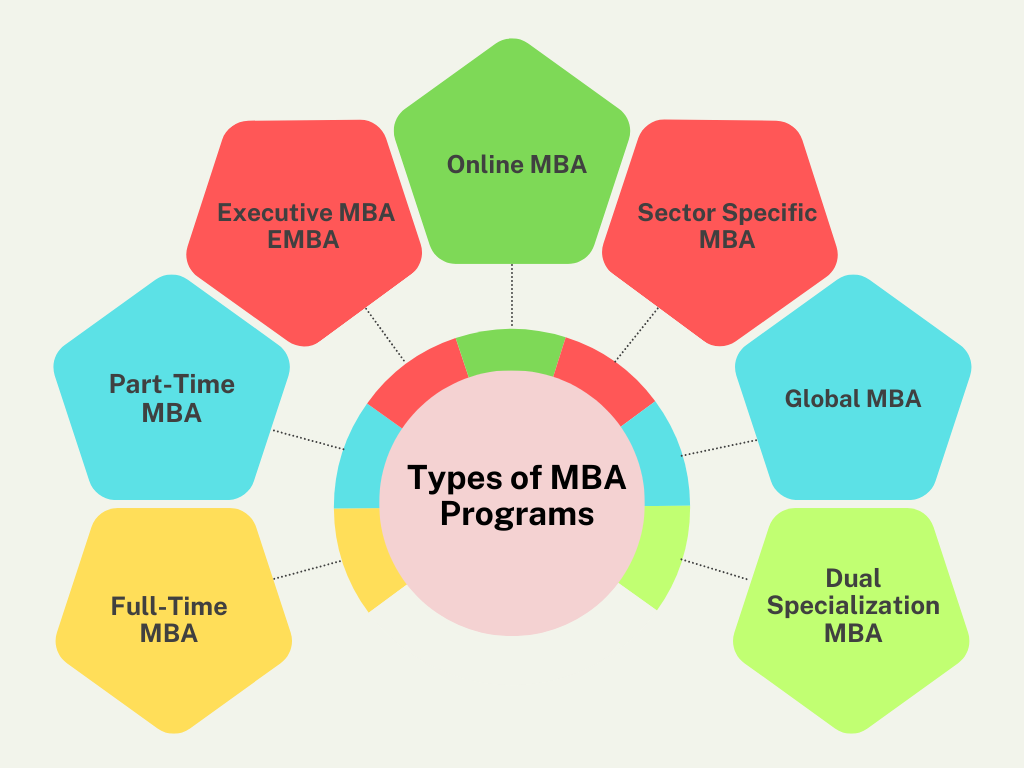
Image-2 Types of MBA Programs
There are several types of Master of Business Administration offered to cater to different needs and preferences of students and professionals.
Some of the common types of MBA programmes include:
Full-Time MBA:
Full time MBA program is a traditional two-year program that offers a comprehensive curriculum with classroom instruction, case studies, projects, internships, and other practical experiences. It is ideal for recent graduates and individuals looking for a career change.
Part-Time MBA:
Designed for Empl who want to pursue an Master Of Business Administration without leaving their jobs, part-time degrees typically have evening or weekend classes to accommodate students’ work schedules. The duration of these programs may vary, ranging from two to three years.
Executive MBA (EMBA):
Targeted at mid-career professionals with significant work experience, executive MBA programs offer a condensed curriculum that allows students to continue working while earning their MBA. Executive MBA program often focus on leadership development and strategic management and may include residential sessions and international modules.
Online Master Of Business Administration:
Increasingly popular among students who seek flexibility and convenience, virtual MBA courses allow students to complete coursework remotely via online platforms. These programs offer asynchronous learning, allowing students to study at their own pace and schedule. Virtual MBAs are suitable for working professionals and individuals who prefer remote learning.
Dual Specialization MBA:
Some MBA degree in India offer dual specialization options, allowing students to focus on two areas of management, such as finance and marketing, human resources and operations, or information technology and global business. Dual specialization MBAs provide students with a broader skill set and increase their marketability in multiple industries.
Sector-Specific MBA:
Specialized MBA degree are tailored to specific industries or sectors, such as healthcare management, agribusiness management, hospitality management, and sports management. These programs provide in-depth knowledge and skills relevant to the particular sector and are suitable for students seeking careers in those industries.
Global MBA:
Global MBA degree offer an international perspective by incorporating international business modules, study tours, and exchange programs with partner universities for International MBA programs. These programs provide students with exposure to global business practices and cultures, making them suitable for individuals interested in pursuing international careers or working for multinational corporations.
Exploring the Different Types of MBAs and Specialty Concentrations

Image-3 SAITM Campus Building
Here’s an exploration of the different types of MBAs and specialty concentrations:
General Master Of Business Administration:
This is the standard MBA certification that provides a broad understanding of business principles across various disciplines such as finance, marketing, operations, human resources, and strategy also known as full time MBA program. It’s suitable for individuals seeking a well-rounded business education.
Specialized MBA:
Specialized MBA degree focus on specific industries or functional areas, such as healthcare management, finance, marketing, entrepreneurship, supply chain management, or information technology. These programs provide in-depth knowledge and skills tailored to the chosen specialization.
Executive MBA (EMBA):-
Designed for experienced professionals with significant work experience, EMBA certification typically cater to mid-career executives seeking to enhance their leadership skills and strategic thinking abilities. EMBA certification often offers flexible schedules to accommodate working individuals.
Part-Time MBA:-
Part-time MBA degree are structured for working individuals who want to earn an MBA while continuing to work. These programs usually offer evening or weekend classes, allowing students to balance their work and study commitments.
Online MBA:
Virtual MBA programs offer flexibility and convenience, allowing students to complete coursework remotely via online platforms. These programs are ideal for working individuals or individuals who prefer remote learning and need flexibility in their schedules.
Dual Degree MBA:
Dual MBA degree programs allow students to pursue two degrees simultaneously, such as an MBA combined with a Master of Science (MS) or Master of International Business (MIB). These programs provide interdisciplinary knowledge and skills, enhancing students’ career prospects.
Global MBA:-
Global MBA programs incorporate international components such as study abroad opportunities, international consulting projects, or language immersion courses for International MBA. These programs offer a global perspective on business and are suitable for individuals interested in working in multinational corporations or pursuing international careers.
Joint MBA Programs:
Joint MBA programs allow students to earn an MBA alongside another graduate degree program, such as a JD/MBA (Juris Doctor/MBA) or MD/MBA (Doctor of Medicine/MBA). These programs combine business education with specialized training in another field, providing students with a unique skill set and career opportunities.
Specialty Concentrations:
Many MBA programs offer specialty concentrations or tracks within the general curriculum, allowing students to focus on specific areas of interest. Common specialty concentrations include finance, marketing, entrepreneurship, healthcare management, sustainability, and data analytics.
MBA Course Eligibility Criteria
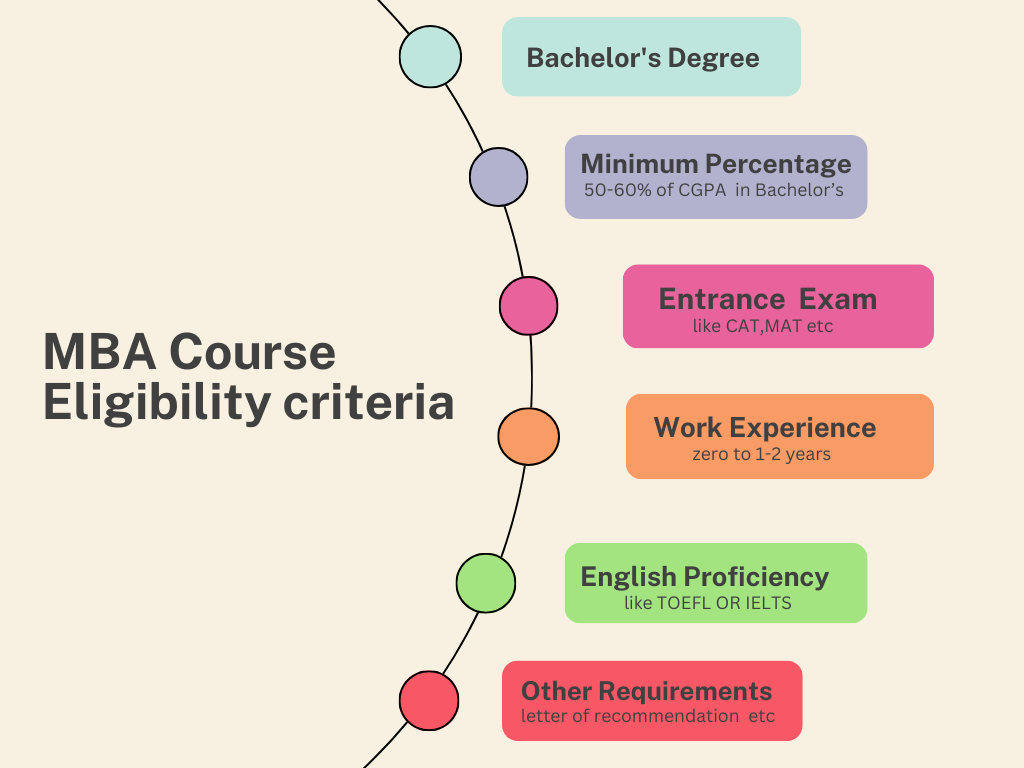
Image-4 MBA Course Eligibility Criteria
The eligibility criteria for Master Of Business Administration courses may vary depending on the institution and the specific program.
However, here are some common eligibility requirements for MBA courses in India:
Bachelor’s Degree:
Candidates must have completed undergraduate degree program (typically a minimum of three years) from a recognized university or institution. The degree can be in any discipline.
Minimum Percentage:
Some institutions may require candidates to have a minimum percentage or CGPA in their bachelor’s degree. This requirement can vary but is often around 50% to 60%. However, this requirement may be waived for candidates with relevant work experience or exceptional achievements.
Entrance Exam:
Many MBA degree require candidates to appear for a national or state-level entrance exam. Common entrance exams include CAT (Common Admission Test), XAT (Xavier Aptitude Test), MAT (Management Aptitude Test), CMAT (Common Management Admission Test), and SNAP (Symbiosis National Aptitude Test). Candidates must meet the cutoff scores set by the respective institutions.
Work Experience:
While not always mandatory, some Master of Business Administration prefer candidates with prior work experience, especially for executive MBA courses. Work experience requirements can vary but may range from one to several years.
English Proficiency:-
Since MBA program is often conducted in English, candidates may need to demonstrate proficiency in the language. This can be done through standardized tests such as TOEFL (Test of English as a Foreign Language) or IELTS (International English Language Testing System), especially for international applicants.
Other Requirements:
Some institutions may have additional requirements such as letters of recommendation, statement of purpose, and/or personal interviews as part of the admission process. Candidates should check the specific requirements of the institutions and programs they are interested in applying to.
MBA Admission Criteria

Image-5 SAITM Boys Hostel
Admissions criteria for MBA(master of business administration) programs typically include:
Bachelor’s Degree:-
Candidates must hold a Undergraduate degree from a recognized university or institution. While some programs accept candidates from any academic background, others may prefer applicants with undergraduate degrees in business or related fields.
Work Experience:-
Most MBA programs prefer candidates with relevant work experience, especially for full-time and executive MBA courses. Work experience requirements can vary but may range from one to several years.
Entrance Exams:
Some MBA courses require candidates to take standardized entrance exams such as the GMAT (Graduate Management Admission Test) or GRE (Graduate Record Examination). Other programs may have their own entrance exams or accept alternative tests such as the CAT (Common Admission Test) in India.
Letters of Recommendation:
Applicants may be required to submit letters of recommendation from employers, professors, or other individuals who can speak to their qualifications and potential for success in an MBA program.
Statement of Purpose/Essay:
Most MBA courses require applicants to submit a statement of purpose or essays outlining their career goals, motivations for pursuing an MBA, and reasons for choosing a particular program.
Interview:
Some MBA courses conduct interviews as part of the admissions process to assess candidates’ communication skills, interpersonal abilities, and fit with the program.
English Proficiency:
International applicants whose native language is not English may be required to demonstrate proficiency in English through standardized tests such as the TOEFL (Test of English as a Foreign Language) or IELTS (International English Language Testing System).
Transcripts:
Applicants must provide official transcripts of their academic records from all colleges and universities attended for the college students.
Resume/CV:
Applicants are typically required to submit a resume or curriculum vitae (CV) detailing their educational background, work experience, extracurricular activities, and other relevant information.
Top MBA Courses Entrance Exams in India

Image-6 Convocation Ceremony for Graduates
Here’s a list of some of the top MBA entrance exams in India:
CAT (Common Admission Test):
Conducted by the Indian Institutes of Management (IIMs), CAT is one of the most widely recognized MBA entrance exams in India. It is accepted by various management institutes across the country.
XAT (Xavier Aptitude Test):
Administered by XLRI Jamshedpur, XAT is another popular MBA entrance exam accepted by numerous B-schools in India.
MAT (Management Aptitude Test):
Conducted by the All India Management Association (AIMA), MAT is a national-level entrance exam accepted by many MBA colleges in India.
CMAT (Common Management Admission Test):
Conducted by the National Testing Agency (NTA), CMAT is a national-level entrance exam accepted by several Master Of Business Administration institutes.
IIFT (Indian Institute of Foreign Trade) Entrance Exam:
Conducted by IIFT, this exam is specifically for admission to its MBA in global Business program.
TISSNET (TISS National Entrance Test):
Conducted by the Tata Institute of Social Sciences (TISS), TISSNET is the entrance exam for admission to its various management programs, including the MA in HRM and Labor Relations (HRM & LR).
How to Prepare for an MBA?

Image-7 Management Students Presentations Session
Preparing for an MBA involves several steps to ensure you are ready for the rigors of the program and maximize your chances of success.
Here are some tips on how to prepare for an MBA:
Research MBA Programs:
Start by researching Master Of Business Administration courses to identify ones that align with your career goals, interests, and preferences. Consider factors such as program reputation, curriculum, faculty, alumni network, location, and specialization options.
Evaluate Your Readiness:
Assess your academic background, work experience, skills, and strengths to determine if you meet the eligibility criteria for MBA degree. Identify any areas where you may need to improve or enhance your qualifications.
Take Entrance Exams:
Depending on the Master Of Business Administration certification you’re interested in, you may need to take standardized entrance exams such as the CAT, XAT, MAT, CMAT, or others. Prepare for these exams by familiarizing yourself with the exam format, practicing sample questions, and taking mock tests.
Enhance Your Profile:
Build a strong profile that showcases your academic achievements, work experience, leadership roles, extracurricular activities, and other accomplishments. Consider gaining relevant work experience, volunteering, or pursuing certifications to strengthen your profile.
Develop Your Skills:
MBA degree requires strong analytical, communication, leadership, and teamwork skills. Work on developing these skills through coursework, projects, internships, or extracurricular activities. Consider taking additional courses or workshops to enhance your skills in areas where you may have weaknesses.
Network:
Build relationships with current MBA students, alumni, faculty, and professionals in your desired industry or field. Attend networking events, informational sessions, and alumni gatherings to expand your network and gain insights into the MBA experience and career opportunities.
Prepare Your Application Materials:
Prepare your application materials carefully, including your resume, statement of purpose, essays, letters of recommendation, and transcripts. Tailor your application materials to each MBA program and highlight relevant experiences and achievements.
Practice Time Management:
MBA degree is intensive and requires strong time management skills to balance coursework, assignments, group projects, and other commitments. Practice effective time management techniques to prioritize tasks and meet deadlines.
Stay Updated:
Stay informed about developments in the business world, current events, and industry trends. Subscribe to relevant publications, attend seminars, webinars, or workshops, and participate in online forums or discussion groups to stay updated and informed.
Stay Motivated and Persistent:
The MBA application process can be challenging and competitive, so stay motivated and persistent in pursuing your goals. Keep a positive attitude, stay focused on your objectives, and don’t be discouraged by setbacks or obstacles along the way.
MBA Specializations
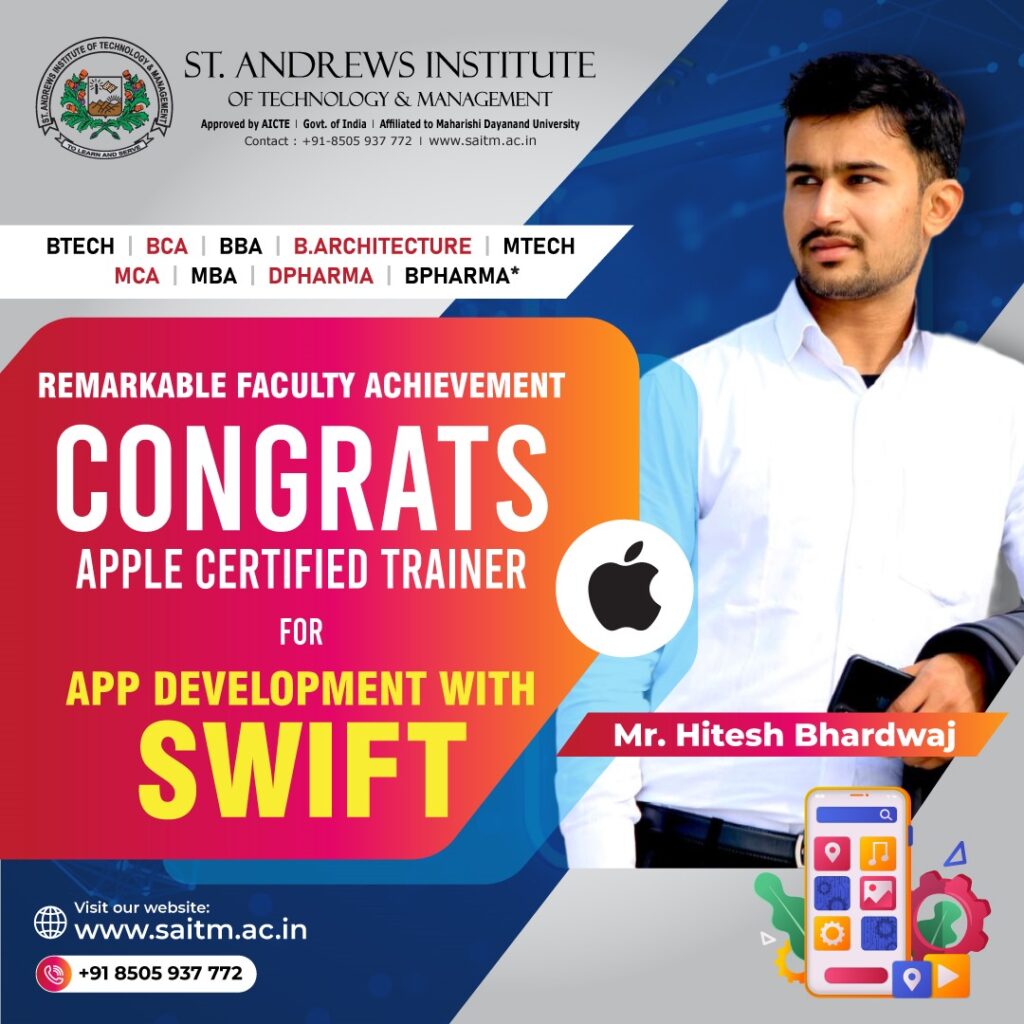
Image-8 Faculty Achievements
MBA (Master of Business Administration) programs offer a wide range of specializations to cater to various career interests and industries.
Here are some common MBA specializations:
Finance
Focuses on financial management, investment banking, corporate finance, and financial markets.
Marketing
Concentrates on market research, brand management, advertising, digital marketing, and consumer behavior.
Human Resources (HR)
Emphasizes talent management, organizational behavior, recruitment, training, and employee relations.
Operations Management
Covers supply chain management, logistics, quality control, project management, and process optimization.
Entrepreneurship
Designed for aspiring entrepreneurs, focusing on startup strategies, venture capital, innovation, and small business management.
Strategy
Focuses on strategic management, business analysis, competitive strategy, and corporate development.
International Business
Concentrates on global trade, cross-cultural management, international marketing, and multinational operations.
Information Technology (IT) Management
Combines business and technology skills, focusing on IT strategy, cybersecurity, digital transformation, and IT project management.
Healthcare Management
Concentrates on healthcare policies, hospital administration, healthcare marketing, and healthcare finance.
Consulting
Prepares students for careers in management consulting, covering problem-solving, client management, and industry analysis.
Supply Chain Management
Concentrates on logistics, procurement, inventory management, and supply chain optimization.
Real Estate
Focuses on property management, real estate finance, real estate development, and investment analysis.
Sustainability/Environmental Management
on sustainable business practices, environmental policy, green technology, and corporate social responsibility.
Luxury Brand Management
Focuses on the management and marketing of luxury brands, including consumer behavior, brand management, and retail strategies.
Data Analytics/Business Analytics
Concentrates on data-driven decision-making, data mining, predictive analytics, and business intelligent.
Top Colleges for MBA Courses

Image-9 Best College Award
Here are some of the top colleges for MBA courses in India:
Indian Institutes of Management (IIMs)
These prestigious institutions are known for their excellence in management education. Some of the prominent IIMs include IIM Ahmedabad, IIM Bangalore, IIM Calcutta, IIM Lucknow, and others.
XLRI – Xavier School of Management, Jamshedpur
XLRI is renowned for its management programs and is highly regarded for its rigorous curriculum, faculty expertise, and strong industry connections.
St. Andrews Institute of Technology and Management, Gurgaon
St. Andrews Institute of Technology and Management (SAITM) offers MBA degree aimed at providing students with comprehensive management education. Located in Gurgaon, Haryana, SAITM focuses on equipping students with the necessary skills and knowledge to excel in the business world. The MBA certification at SAITM emphasize practical learning, industry exposure, and holistic development, preparing graduates for leadership roles in various sectors.
Indian School of Business (ISB), Hyderabad
ISB is a leading business school known for its one-year MBA program designed for experienced professionals. It is recognized for its global perspective and high-quality education.
Faculty of Management Studies (FMS), University of Delhi
FMS Delhi is one of the oldest business schools in India and is known for its affordable MBA degree and excellent faculty.
SP Jain Institute of Management and Research (SPJIMR), Mumbai
SPJIMR is known for its innovative pedagogy, experiential learning approach, and strong industry interface. Its MBA program is highly regarded.
Narsee Monjee Institute of Management Studies (NMIMS), Mumbai
NMIMS is a leading private business school known for its diverse programs, innovative teaching methods, and strong industry connections.
Xavier Institute of Management (XIMB), Bhubaneswar
XIMB is known for its academic rigor, focus on ethics and social responsibility, and strong industry partnerships.
Tata Institute of Social Sciences (TISS), Mumbai
TISS offers MBA program with a focus on social sector management, HRM, and other specialized areas. It is known for its commitment to social justice and inclusive development.
Expected Duration Of an MBA Program
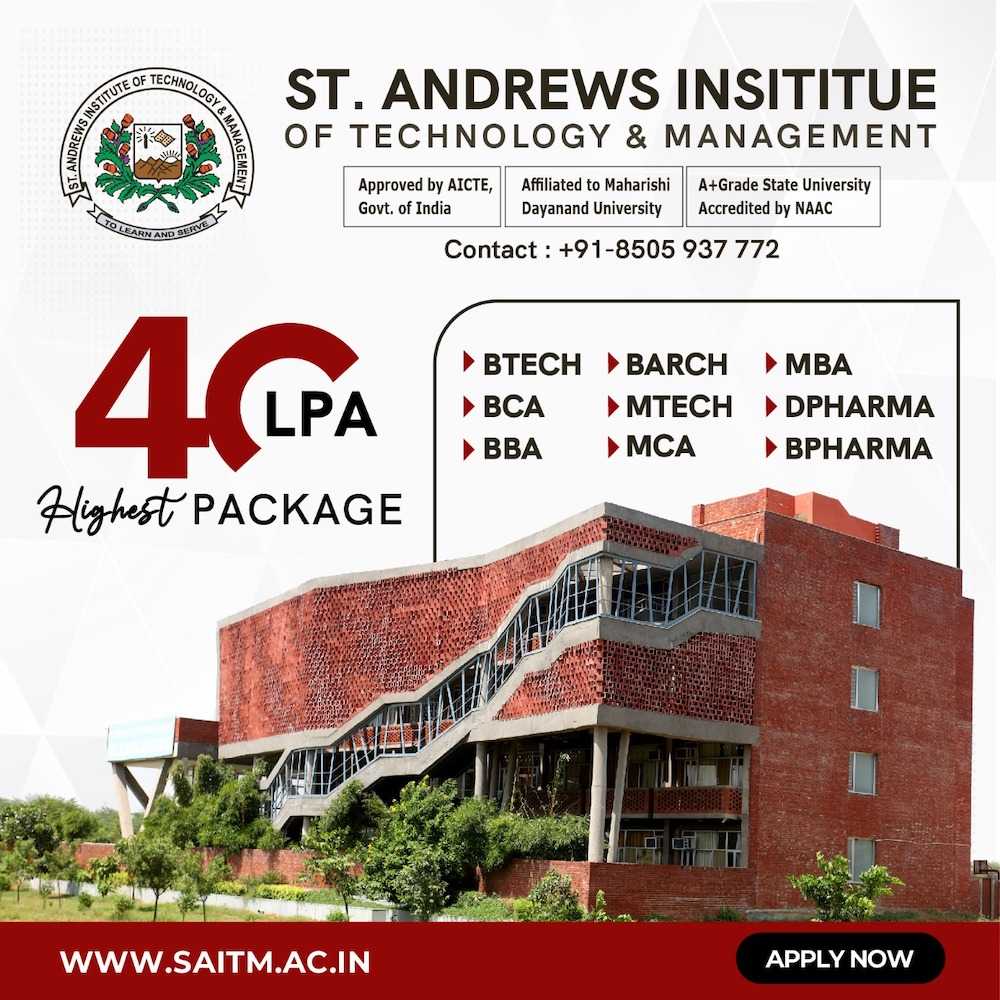
Image-10 Detail About Courses
The expected duration of an MBA program can vary depending on several factors such as the institution offering the program, the specific focus or concentration of the MBA, and whether it’s a full-time, part-time, or executive MBA.
However, I can provide a general overview:
Duration:
- Full-time MBA programs typically last between 1 to 2 years, with most programs being around 1.5 years in duration.
- Executive MBA programs are often designed to be completed while working and can take anywhere from 2 to 5 years to finish, depending on the pace at which the student chooses to study.
- Executive MBA (EMBA) programs are geared towards experienced professionals and are usually completed while working full-time. These programs often take 1 to 2 years to finish, with classes typically held on weekends or in intensive modules.
MBA Degree Syllabus
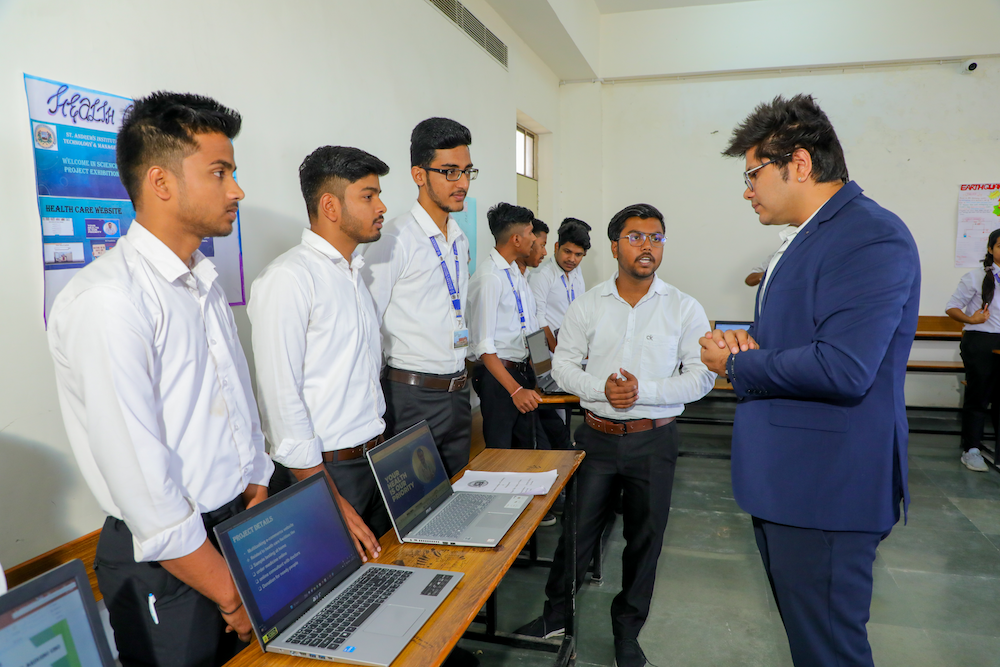
Image-11 Discussion about Project
The MBA degree syllabus typically covers a wide range of MBA subjects to provide students with a comprehensive understanding of various aspects of business management.
While specific MBA subjects may vary depending on the institution and program specialization, here is a general overview of the common topics covered in an MBA curriculum:
Core Management Subjects:
- Organizational Behavior
- Business Communication
- Managerial Economics
- Financial Accounting
- Managerial Accounting
- Corporate Finance
- Marketing Management
- Operations Management
- Strategic Management
- HRM
MBA Specialization Courses (Varies based on chosen concentration)
- Finance: Financial Management, Investment Analysis, Corporate Valuation, Financial Derivatives.
- Marketing: Consumer Behavior, Brand Management, Marketing Research, Digital Marketing.
- HRM: Talent Management, Performance Management, Training and Development, Industrial Relations.
- Operations Management: Supply Chain Management, Quality Management, Project Management, Logistics.
- Information Technology: Management Information Systems, Database Management, Business Analytics, IT Strategy.
- Entrepreneurship: New Venture Creation, Business Plan Development, Entrepreneurial Finance, Innovation Management.
Elective Courses (Based on student’s interests and career goals)
- Global Business
- Corporate Social Responsibility
- Business Law and Ethics
- Leadership and Change Management
- Negotiation and Conflict Resolution
- Healthcare Management
- Sustainable Business Practices
- Risk Management
Practical Learning Components
- Case Studies: Analyzing real-world business scenarios and developing strategic solutions.
- Group Projects: Collaborating with peers to solve business problems and present findings.
- Internships: Gaining hands-on experience through internships in companies or organizations.
- Industry Visits: Visiting companies to understand their operations, management practices, and industry dynamics.
- Business Simulations: Participating in simulated business environments to develop decision-making skills.
Research and Thesis/Project Work
- Research Methodology: Learning various research methods and techniques.
- Thesis/Project: Conducting independent research or a practical project under the guidance of faculty.
MBA Course Career Scope

Image-12 National Conference at SAITM
The career scope for MBA graduates is vast and diverse, offering opportunities across various industries, functions, and geographic locations.
Here are some of the career paths and roles that MBA scholars commonly pursue:
Management Consulting:
MBA scholars often work in management consulting firms, advising clients on strategic, operational, and organizational issues. They may work on projects related to market entry, business expansion, cost optimization, and performance improvement.
Finance and Investment Banking
MBA scholars with a specialization in finance may work in investment banks, financial institutions, or corporate finance departments. They may hold roles such as financial analyst, investment banker, corporate treasurer, or financial manager.
Marketing and Brand Management
MBA scholars with a specialization in marketing often pursue careers in marketing and brand management roles. They may work for consumer goods companies, advertising agencies, or market research firms, managing product launches, branding campaigns, and market research projects.
Operations and Supply Chain Management
MBA scholars specializing in operations and supply chain management may work in manufacturing companies, logistics firms, or consulting organizations. They may hold roles such as operations manager, supply chain analyst, or logistics coordinator.
Human Resource Management
MBA scholars with a specialization in HRM may work in HR departments of companies, recruitment agencies, or consulting firms. They may hold roles such as HR manager, talent acquisition specialist, or organizational development consultant.
Entrepreneurship and Startups
MBA scholars with an entrepreneurial mindset may choose to start their own businesses or join startups. They may identify business opportunities, develop business plans, raise funds, and launch and grow their ventures.
Technology Management
MBA scholars with a specialization in technology management may work in technology companies, IT consulting firms, or corporate IT departments. They may hold roles such as IT project manager, technology strategist, or product manager.
Healthcare Management:
MBA scholars with a specialization in healthcare management may work in hospitals, healthcare consulting firms, pharmaceutical companies, or health insurance companies. They may hold roles such as healthcare administrator, healthcare consultant, or pharmaceutical product manager.
Global Business
MBA scholars with a focus on global business may work for multinational corporations, export-import firms, or international trade organizations. They may hold roles such as global business development manager, global market analyst, or international trade consultant.
Nonprofit and Social Sector
MBA scholars interested in social impact and sustainability may work for nonprofit organizations, NGOs, or social enterprises. They may hold roles such as program manager, fundraising manager, or social impact consultant.
MBA Graduates Salary
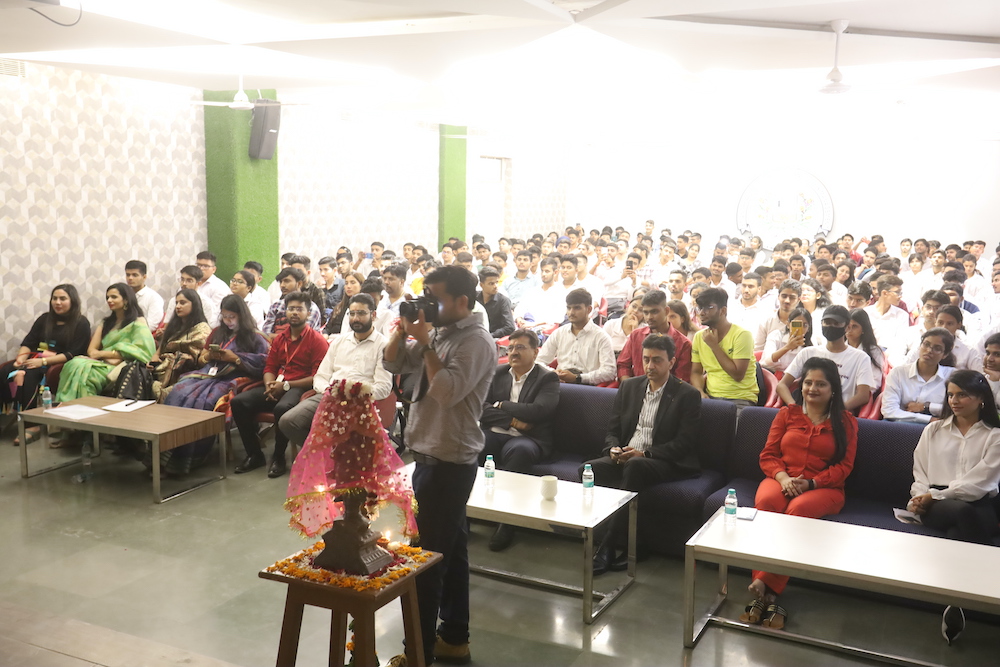
Image-13 Orientation program for New Students
The Average salary of MBA scholars in India can vary widely based on factors such as the institute from which they graduated, their specialization, work experience, industry, job role, and geographic location. Here’s an overview of the Average salary range for MBA scholars in India:
Entry-Level Positions:
- Entry-level MBA scholars can expect salaries ranging from ₹6 lakhs to ₹12 lakhs per annum on average, depending on the factors mentioned above.
- Salaries may be higher for graduates from top-tier institutes such as the Indian Institutes of Management (IIMs) or other prestigious business school.
Mid-Level Positions:
- MBA scholars with a few years of work experience can earn salaries ranging from ₹10 lakhs to ₹20 lakhs per annum, or higher.
- Salaries may vary based on the industry and specialization, with roles in management consulting, investment banking, and corporate finance often offering higher compensation.
Senior-Level Positions:
- MBA scholars with significant work experience and expertise in their field can command salaries ranging from ₹15 lakhs to ₹40 lakhs per annum or more.
- Senior management roles such as Director, Vice President, or C-suite positions in companies may offer even higher compensation, including bonuses, stock options, and other benefits.
Industry-Specific Variations:
- Salaries for MBA scholars can vary based on the industry they work in. For example, graduates working in finance, consulting, or technology sectors may earn higher salaries compared to those in non-profit or government sectors.
- Location also plays a significant role, with salaries typically higher in metropolitan cities such as Mumbai, Delhi, Bangalore, and Hyderabad compared to other cities or rural areas.
Specialization-Specific Variations:
- MBA scholars with specialized skills or expertise in areas such as finance, marketing, operations, or human resources may command higher salaries compared to general management graduates.
- Specializations in emerging fields such as data analytics, digital marketing, or healthcare management may also offer lucrative career opportunities with higher salaries.
MBA Graduates Top Recruiters and Salary
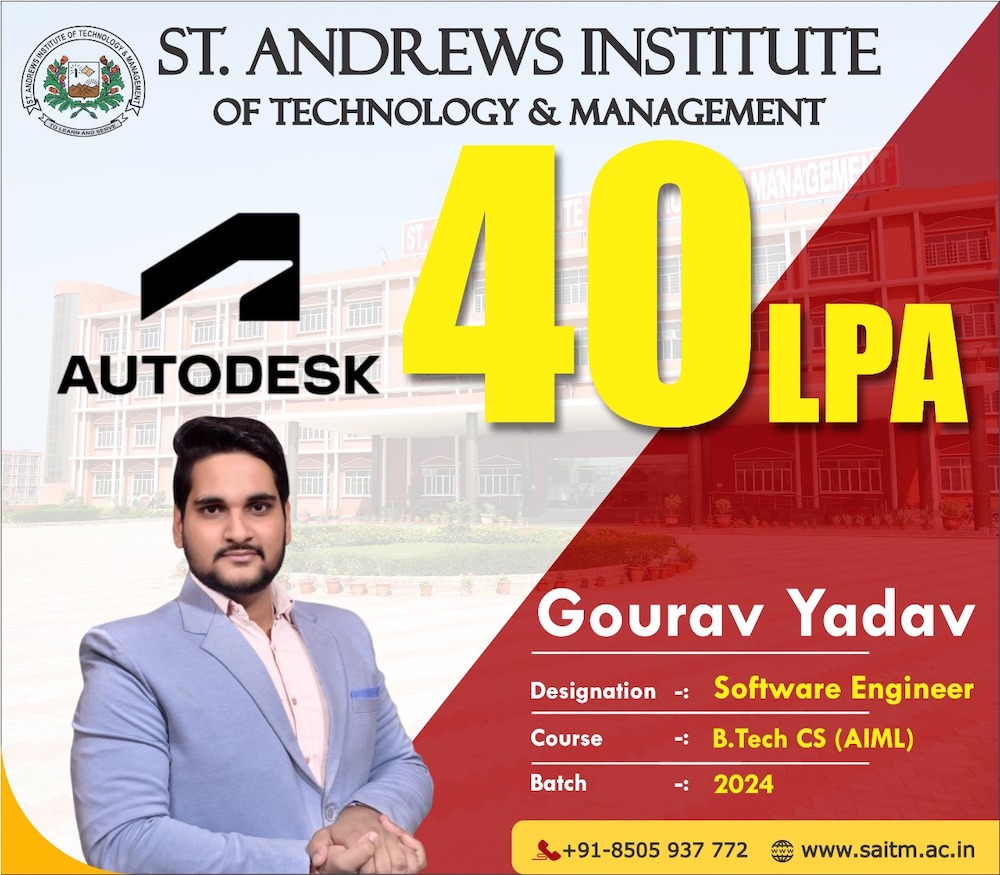
Image-14 Highest Package
The salary and top recruiters for MBA scholars vary based on factors such as industry, job role, experience, and location. However, here’s an overview of salary ranges and some of the top recruiters for MBA scholars in India:
Management Consulting–
Salary Range: Entry-level consultants can expect salaries ranging from ₹8-15 lakhs per annum, while experienced consultants can earn upwards of ₹20 lakhs per annum.
Top Recruiters: McKinsey & Company, Boston Consulting Group (BCG), Bain & Company, Deloitte, Accenture, KPMG.
Finance and Investment Banking:
Salary Range: Entry-level analysts can expect salaries ranging from ₹10-20 lakhs per annum, while experienced professionals in investment banking can earn significantly higher.
Top Recruiters: Goldman Sachs, Morgan Stanley, J.P. Morgan, Citibank, Barclays, HDFC Bank, ICICI Bank.
Marketing and Brand Management:
Salary Range: Entry-level marketing managers can expect salaries ranging from ₹6-12 lakhs per annum, while experienced professionals can earn upwards of ₹20 lakhs per annum.
Top Recruiters: Procter & Gamble (P&G), Hindustan Unilever Limited (HUL), Nestlé, PepsiCo, Coca-Cola, Amazon, Google.
Operations and Supply Chain Management:
Salary Range: Entry-level operations managers can expect salaries ranging from ₹7-15 lakhs per annum, while experienced professionals can earn upwards of ₹20 lakhs per annum.
Top Recruiters: Amazon, Flipkart, Walmart, Tata Consultancy Services (TCS), Infosys, Wipro, DHL.
HRM
Salary Range: Entry-level HR managers can expect salaries ranging from ₹6-12 lakhs per annum, while experienced professionals can earn upwards of ₹20 lakhs per annum.
Top Recruiters: IBM, Accenture, Tata Steel, Larsen & Toubro (L&T), Hindustan Coca-Cola Beverages, Reliance Industries, Infosys.
Entrepreneurship and Startups:
Salary Range: Salaries in startups can vary widely based on the success and growth of the venture. Founders and co-founders may earn significant equity in addition to salaries.
Top Startups: Flipkart, Ola, Paytm, Zomato, Swiggy, Byju’s, OYO Rooms.
Technology Management:
Salary Range: Entry-level technology managers can expect salaries ranging from ₹8-15 lakhs per annum, while experienced professionals can earn upwards of ₹20 lakhs per annum.
Top Recruiters: Google, Microsoft, Amazon Web Services (AWS), IBM, Infosys, Tata Consultancy Services (TCS), Accenture.
Healthcare Management–
Salary Range: Entry-level healthcare managers can expect salaries ranging from ₹6-12 lakhs per annum, while experienced professionals can earn upwards of ₹20 lakhs per annum.
Top Recruiters: Apollo Hospitals, Fortis Healthcare, Max Healthcare, Cipla, Novartis, GlaxoSmithKline (GSK).
International Business:
Salary Range: Salary ranges for global business roles can vary widely based on the organization and location.
Top Recruiters: Multinational corporations (MNCs), international trade organizations, global consulting firms, diplomatic missions and embassies.
Part-Time MBA Degree
Part-time MBA programs in India cater to working professionals who seek to enhance their skills and advance their careers while continuing to work. These programs offer flexibility in scheduling and are typically structured to accommodate the needs of individuals who cannot commit to full-time study due to work or other obligations.
Here’s an overview of executive MBA programs in India:
Duration
Executive MBA programs in India usually span over a longer duration compared to full-time programs. They can range from 2 to 5 years, depending on the specific program structure and the pace at which the student chooses to complete the coursework.
Coursework
The coursework in executive MBA programs is similar to that of full-time programs and typically covers core business areas such as finance, marketing, operations management, human resources, and strategy. However, part-time programs often offer a more flexible course schedule, allowing students to take classes in the evenings, weekends, or through online platforms.
Delivery Formats
Executive MBA programs in India may be offered in various formats to accommodate the needs of working individuals:
Evening Classes: Some programs conduct classes during weekday evenings, allowing students to attend after work.
Weekend Classes: Many executive MBA programs schedule classes on weekends, making it easier for working individuals to balance work and studies.
Online or Blended Learning: With the increasing popularity of online education, some executive MBA programs offer courses through online platforms, allowing students to study at their own pace and convenience.
Advantages
Flexibility
One of the most significant advantages of Executive MBA programs is their flexibility. Working individuals can continue to work while pursuing their MBA, allowing them to apply their learning directly to their current job roles.
Less Disruption to Career
Executive MBA programs minimize the disruption to a student’s career since they can continue working full-time. This means they can maintain their income and career progression while advancing their education.
Real-world Application
Students in executive MBA programs can immediately apply what they learn in the classroom to their workplace, enhancing their skills and knowledge in a practical context.
Networking Opportunities
Executive MBA programs often attract students with diverse professional backgrounds, providing valuable networking individuals with fellow students, alumni, and industry professionals.
Cost-Effectiveness
Since executive MBA students can continue earning a salary, they may not need to take out significant loans or rely on savings to fund their education. This can make executive MBA programs more financially feasible for some individuals.
Disadvantages:
Longer Duration
Executive MBA programs typically take longer to complete compared to full-time programs. Balancing work, studies, and personal commitments may prolong the duration of the program, which could be a disadvantage for those looking to advance their careers quickly.
Less Intensive Learning Experience
Executive MBA programs may not offer the same level of immersive learning experience as full-time programs. Students may have less time for extracurricular activities, networking events, and other opportunities typically available in a full-time MBA setting.
Limited Access to Campus Resources
Part-time students may have limited access to campus resources such as career services, on-campus recruiting events, and student clubs due to their work commitments and scheduling conflicts.
Difficulty Balancing Work and Studies
Balancing work, studies, and personal commitments can be challenging and may lead to increased stress and burnout for some part-time MBA students.
Career Transition Challenges
While executive MBA programs allow students to continue working in their current roles, they may face challenges if they intend to switch careers or industries. Full-time MBA programs often provide more extensive career support and recruiting opportunities for students seeking career transitions.
Online MBA

Image-15 SAITM Administration Block
Virtual MBA programs in India offer flexibility and convenience for working professionals and individuals who cannot attend traditional on-campus classes due to various reasons. Here are some key points regarding Virtual MBA programs in India:
Advantages:
Flexibility
Virtual MBA programs allow students to study at their own pace and convenience. They can access course materials, lectures, and assignments from anywhere with an internet connection, making it easier for working professionals to balance their studies with their job and personal commitments.
Cost-Effectiveness
Virtual MBA programs often cost less than traditional on-campus programs since they eliminate the need for commuting, accommodation, and other expenses associated with attending classes in person. Additionally, students can continue working full-time while pursuing their MBA, enabling them to maintain their income.
Accessibility
Virtual MBA programs provide access to education for individuals who may not have the opportunity to attend on-campus classes due to geographical constraints, family responsibilities, or work obligations. This accessibility allows a more diverse group of students to pursue higher education.
Customization
Some virtual MBA programs offer a variety of specializations and elective courses, allowing students to tailor their studies to their specific career goals and interests. This customization enables students to acquire specialized knowledge and skills that align with their desired career paths.
Networking Opportunities
Virtual MBA programs often include virtual networking opportunities, discussion forums, and group projects that facilitate interaction and collaboration among students, faculty, and alumni. These networking opportunities can be valuable for building professional connections and expanding one’s professional network.
Disadvantages
Limited Face-to-Face Interaction
Online MBA programs lack the face-to-face interaction found in traditional on-campus programs. While virtual communication tools facilitate interaction with instructors and peers, some students may miss the interpersonal connections and networking opportunities available in a physical classroom setting.
Self-Motivation Required
Online learning requires a high level of self-discipline and motivation. Students must manage their time effectively, stay organized, and remain committed to their studies without the structure and accountability provided by regular classroom attendance.
Potential for Isolation
Studying online can be isolating for some students, particularly those who thrive in a collaborative learning environment. Without regular face-to-face interaction with classmates and instructors, students may feel disconnected from the academic community and miss out on the social aspects of campus life.
Perception by Employers
While online education is becoming increasingly accepted, some employers may still perceive online MBA degrees differently from traditional on-campus degrees. It’s essential for students to research the reputation and accreditation of the online MBA program they are considering to ensure it meets their career objectives and is recognized by employers.
Courses after MBA
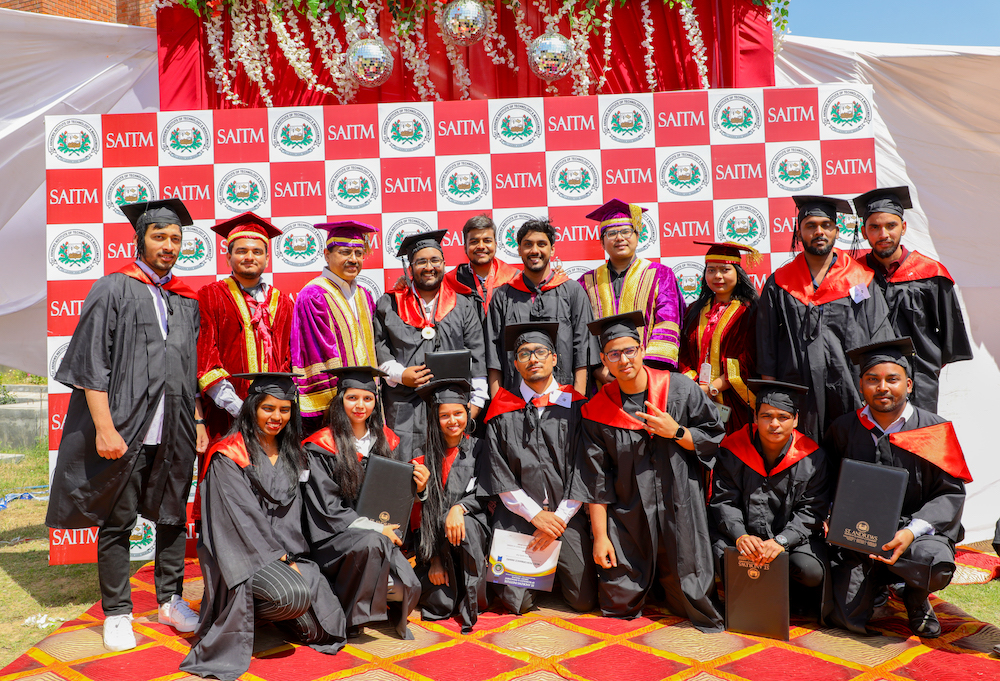
Image-16 Convocation Ceremony
After completing an MBA degree in India, individuals have several options for further education or professional development.
Here are some common courses:
Ph.D. in Management
Some MBA scholars choose to pursue a Ph.D. in Management or a related field to deepen their expertise and pursue careers in academia, research, or consulting. A Ph.D. program typically involves advanced coursework, research, and the completion of a doctoral dissertation.
Executive Education Programs
Many business schools and universities offer executive education programs designed for mid-career professionals seeking to enhance their leadership skills, expand their business knowledge, or pursue specialized training in areas such as finance, marketing, or strategy.
Certifications
MBA scholars may pursue professional certifications to enhance their credentials and demonstrate expertise in specific areas of business. Popular certifications include Certified Financial Analyst (CFA), Project Management Professional (PMP), Chartered Institute of Management Accountants (CIMA), Six Sigma, and Digital Marketing certifications.
Specialized Master’s Programs
MBA scholars interested in further specialization may consider pursuing a specialized master’s degree in areas such as finance, marketing, human resources, operations management, or entrepreneurship. These programs provide in-depth knowledge and skills in a specific area of business.
Short-Term Courses and Workshops
MBA scholars may opt for short-term courses, workshops, or seminars to gain specialized skills, stay updated on industry trends, or explore new areas of interest. These courses are often offered by professional organizations, industry associations, or online platforms.
Entrepreneurship Programs
MBA scholars interested in entrepreneurship may enroll in entrepreneurship programs or incubation centers offered by most business schools, universities, or government initiatives. These programs provide support, resources, and mentorship to aspiring entrepreneurs to develop and launch their ventures.
Global Exchange Programs
Some MBA scholars may choose to participate in global exchange programs or study tours to gain international exposure, expand their network, and learn about business practices in different countries. These programs are often offered by top business schools as part of their international partnerships or exchange agreements.
Professional Development Courses
MBA scholars may enroll in professional development courses or workshops to enhance their soft skills, leadership capabilities, communication abilities, and emotional intelligence. These courses focus on personal and professional growth and are offered by various institutions and organizations.
Online Learning Platforms
With the increasing popularity of online learning, MBA graduates can access a wide range of online courses, webinars, and virtual conferences on business-related topics offered by reputed institutions, industry experts, and online learning platforms.
FAQ’S
What is an MBA and what does it do?
Master of Business Administration, is a graduate-level degree that focuses on various aspects of business management and administration. It is one of the most sought-after and respected qualifications in the field of business and is designed to equip individuals with the knowledge, skills, and competencies needed to succeed in leadership and management roles across diverse industries and sectors.
Can I do MBA after 12th?
In India, it is not common to pursue a traditional MBA directly after completing 12th grade. The typical path to an Master Of Business Administration in India involves completing a bachelor’s degree (such as a Bachelor of Arts, Bachelor of Commerce, Bachelor of Science, etc.) followed by gaining some work experience and then applying for an Master Of Business Administration program.
However, there are some integrated MBA programs offered by certain universities or institutions in India that allow students to enroll directly after completing 12th grade. These integrated programs combine undergraduate and postgraduate studies, enabling students to earn a bachelor’s degree along with an MBA within a specified duration, often spanning five years.
Which MBA has highest salary?
Among Master Of Business Administration specializations, finance typically offers the highest salaries due to roles in investment banking, corporate finance, and private equity. However, salaries can vary based on factors like industry demand, individual skills, and employer reputation. Other lucrative options include consulting, information technology management, marketing, operations management, and entrepreneurship, depending on market trends and employer demand.
What is the qualification for Master Of Business Administration?
Qualifications for an MBA typically include a bachelor’s degree from a recognized university, proficiency in English (often demonstrated through standardized tests like the TOEFL or IELTS), relevant work experience (often preferred but not always required), and a competitive score on a standardized entrance exam like the GMAT or GRE.
What is Master Of Business Administration course used for?
An MBA program is used for developing expertise in various aspects of business management, including finance, marketing, operations, human resources, and strategy. It equips individuals with analytical, leadership, and problem-solving skills, preparing them for leadership roles in diverse industries or entrepreneurship. Master Of Business Administration graduates often pursue careers in corporate management, consulting, finance, marketing, operations, or start their own businesses.
What is qualification for MBA?
The typical qualification for an Master Of Business Administration includes a bachelor’s degree from a recognized university, preferably in a related field such as business, economics, or engineering. Some programs require relevant work experience, while others may admit students directly after undergraduate studies. Proficiency in English is often necessary, demonstrated through standardized tests like TOEFL or IELTS. Additionally, a competitive score on exams like GMAT or GRE is usually required.
What is the subjects in Master Of Business Administration?
Top Master Of Business Administration programs typically cover a broad range of subjects related to business management and administration. Common subjects include finance, marketing, operations management, human resources, organizational behaviour, strategy, economics, accounting, entrepreneurship, and business ethics. Additionally, students may have the opportunity to specialize in specific areas through elective courses or concentrations, such as finance, marketing, healthcare management, or global business.
What is the work of Master Of Business Administration?
The work of an Master Of Business Administration varies depending on their specialization and industry. Generally, MBAs are involved in strategic planning, financial analysis, project management, marketing, operations optimization, and leadership. They may work in diverse sectors such as finance, consulting, technology, healthcare, or entrepreneurship, contributing to organizational growth, innovation, and profitability through effective management practices and decision-making.





